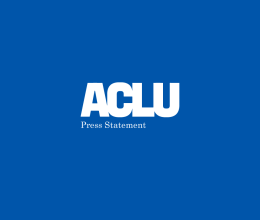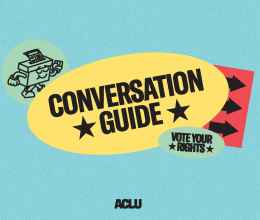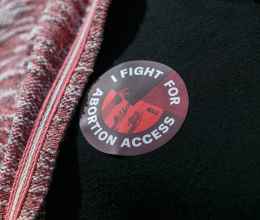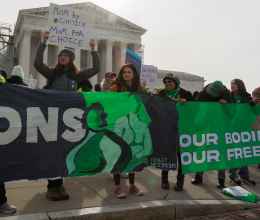
It's an urgent time when it comes to reproductive freedom in America.
The Supreme Court has chosen to hear a case this fall that could overturn Roe v. Wade while states continue to push abortion access further and further out of reach.
As distressing as it is, the ACLU was built for moments like these. Our dedicated team of attorneys and advocates are on the frontlines and it's your activism that fuels the work.
In the states: The wave of anti-abortion bills in the states this year is a coordinated plan by politicians to eliminate access state-by-state, a strategy that will disproportionately harm Black and Brown communities and low-income people due to structural racism and inequities. But with our nationwide affiliate presence, we're filing both quick, defensive lawsuits against these laws – and strategic, affirmative lawsuits to expand access.
- Recently, for example, we filed a lawsuit challenging Arizona's abortion ban that would charge doctors with new felony crimes for providing abortion care when it seems a patient's decision might be based on a fetal genetic condition. The lawsuit also challenges a “personhood requirement” that would classify fetuses, embryos, and fertilized eggs as people starting at the point of conception by state law. But the government doesn't have the power to make reproductive decisions for us and that's why we're asking the court to block the restrictions immediately.
- In Texas, the ACLU and partners have filed a federal lawsuit challenging the state's unconstitutional 6-week abortion ban, which authorizes any person to sue another for helping someone get an abortion for a minimum of $10,000. If not blocked, this law will go into effect September 1. Considering a federal appeals court just upheld a Texas law that bans an incredibly common abortion procedure – the fight to block this 6-week ban in court is all the more crucial.
- In Guam, we're going back to court to protect abortion access across the island after a partial victory in March. And we also just blocked a near-total ban on abortion in Arkansas as well. In addition, our ongoing litigation is currently blocking similar bans in Alabama, Georgia, Kentucky, Missouri, Ohio, and Tennessee.
At the Supreme Court: We're all bracing for the next Supreme Court term this October. The ACLU specifically is dedicated to both its own legal efforts – as well as our support as an advocacy partner – for two cases in particular.
- In EMW Women's Surgical Center, P.S.C. v. Meier – ACLU's case challenging a state law that would prevent many people from getting abortion care they need – the Supreme Court agreed to decide whether Kentucky's attorney general can intervene at the last minute to try to put a law that two courts already declared unconstitutional into effect. Every court to consider a law like Kentucky's has blocked it and we will continue to work to make sure this ban never takes effect.
- Finally, the case the nation is watching – and what anti-abortion politicians have been waiting for since Roe v. Wade was decided: Dobbs v. Jackson Women's Health Organization. In this case, the Center for Reproductive Rights and the only clinic in Mississippi, are challenging Mississippi's ban on abortion at 15 weeks of pregnancy. The state of Mississippi has asked the court to overrule Roe outright and to hold that there is no constitutional right to abortion at all.
We know how overwhelming all this news can be. But ACLU litigation has so far kept clinics open and ensured services were accessible to thousands of people.
So, make no mistake when we say we’re not letting up. ACLU litigation has so far kept clinics open and ensured services were accessible to thousands of people. Abortion is still legal everywhere in America and we'll fight against anyone who tries to take that right away.





